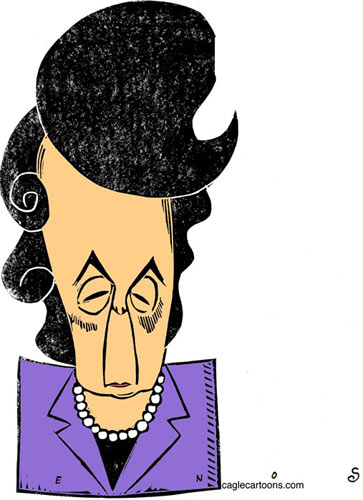
Dianne Feinstein is not exactly the Wicked Witch of the West, though she is from the Left Coast, and does a convincing imitation of Cruella de Vil, who tormented all those innocent puppies in Walt Disney's "101 Dalmatians." Alas, this is real life.
Mrs. Feinstein has not tormented puppies, so far as anyone knows, but she has tormented several of President Trump's judicial nominees, particularly Brett Kavanaugh, which is almost as bad as being mean to puppies. Her late smear of Judge Brett Kavanaugh, which has brought considerable disgrace to the U.S. Senate, will be the last thing history will remember about Mrs. Feinstein, who was even once the mayor of San Francisco.
The senator was once admired by many conservatives, who understood how difficult it must have been to survive in the city that called itself "Baghdad by the Bay." Now it more resembles "Pyongyang by the Bay," where a dissenting opinion could cost you, literally, your head. No beheadings, not yet. Character assassination is more to the taste of the Left Coast.
This reputation for avoiding a closed mind does not please a California constituency. Why would anyone consider looking at someone else's point of view? She was expected, after all, to Bork all Republican judicial candidates. She thought the ambush of Brett Kavanaugh as merely necessary for survival. She didn't believe "Dr." Ford, either. She had tried to make amends earlier with her astonishing interrogation of Amy Coney Barrett, a law professor at Notre Dame, when she was nominated for a seat on the U.S. Court of Appeals for the 7th Circuit in Chicago.
Professor Barrett is a Roman Catholic, and a devout one besides, and this rankled Mrs. Feinstein. Miss Barrett had written that Catholic judges should never impose their religious beliefs on the law. "Judges cannot, nor should they try to, align our legal system with the Church's moral teaching whenever the two diverge," she said. "They should, however, conform their own behavior to the Church standard. Perhaps their personal behavior will have some effect."
This was not good enough for Mrs. Feinstein, posing as an inspector of the religious police. "Dogma and law are two different things," Mrs. Feinstein lectured her. "I think in your case, Professor, when [I] read your speeches, the conclusion one draws is that the dogma lives loudly within you, and that's of concern."
This struck many professors, lawyers, churchmen and rabbis as alarming. So, too, the Anti-Defamation League. They were concerned that it violated the spirit if not the law of Article VI of the Constitution, which states that "no religious test shall ever be required as a qualification to any office or public trust under the United States."
Christopher Eisgruber, the constitutional scholar and president of Princeton University, wrote an unusual open letter correcting the senator. The prohibition or religious tests in Article VI, he said, "is a critical guarantee of equality and liberty, and it is part of what should make all of us proud to be Americans." Noah Feldman, a law professor at Harvard, observed that "it's legitimate for senators to seek assurances that a judge will rule according to the law. It's outrageous, and unconstitutional, to suggest or even imply that a nominee's religious faith would presumptively disqualify [Professor Barrett] from office."
The senator's office, trying to quell the storm of outrage, cited a speech in which Professor Barrett told graduates that "your legal career is but a means to an end, and that end is building the kingdom of G od." The Jewish principle of "tikkun olam," which expresses the hope that Jews like Mrs. Feinstein should work to "repair the world with G od's kingship." This doesn't conflict with Professor Barrett's admonition to Notre Dame graduates. G od knows the world needs more than a few repairs, and the cause needs all the help it can get, from Jews no less than Christians.
But if hard times make a monkey eat red pepper, winning re-election can make senators say silly things. California's so-called jungle election system, which enables the two top primary winners regardless of party affiliation to run against each other in the general election, has pitted Kevin de Leon as the challenger against Mrs. Feinstein in the Nov. 6 general election.
This excuses Mrs. Feinstein, by her lights, for saying the silly things, because it's in no violation of the first rule of politics that (almost) anything goes. Politicians generally figure that they'll be dead for a long time, so enjoy life now. For the senator, at 85, it's now or never. This excuses the new Dianne Feinstein for renouncing the original (and better) Dianne Feinstein. The original might not recognize the new, and that's sad for all of us.
(COMMENT, PLEASE, BELOW)
JWR contributor Wesley Pruden is editor emeritus of The Washington Times. His column has appeared in JWR since March, 2000.


 Contact The Editor
Contact The Editor
 Articles By This Author
Articles By This Author